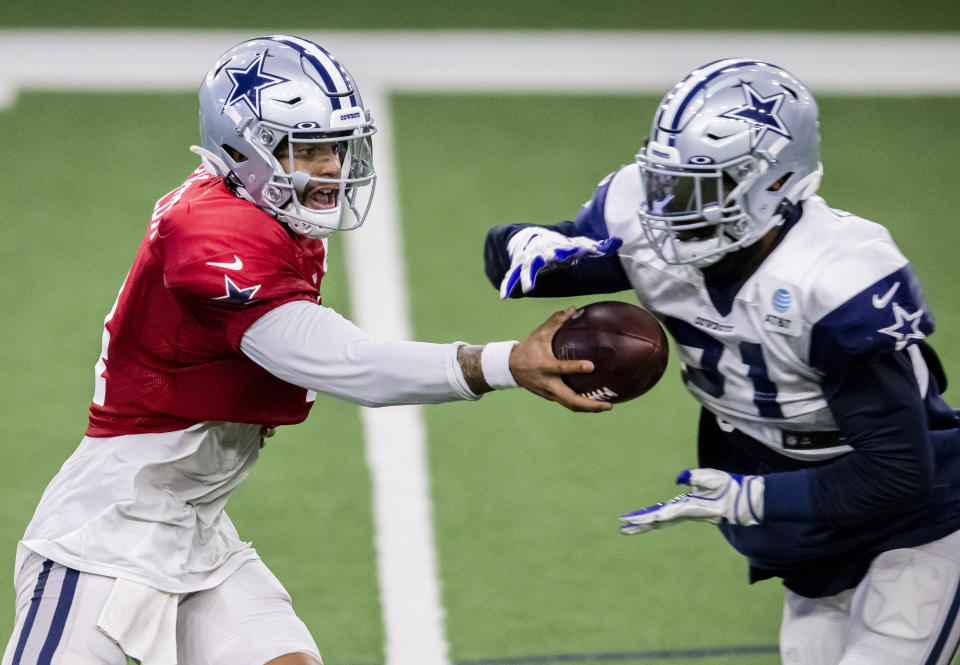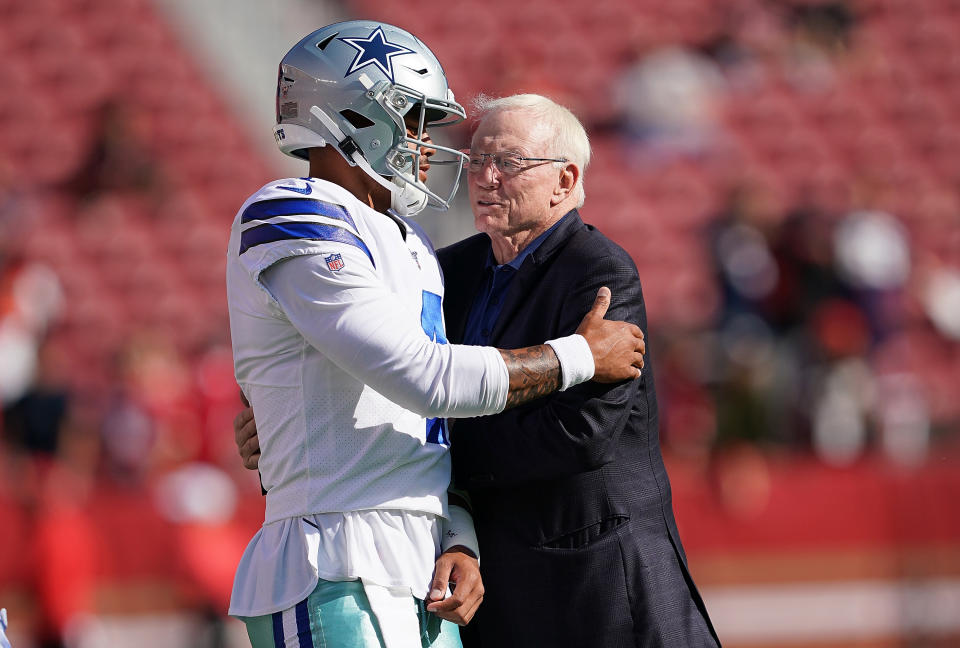Remember when people laughed at Dak Prescott's $40M a year demand of Cowboys? Look who's in control now.
It’s not one thing that gets it done at the negotiating table for Dak Prescott and the Dallas Cowboys.
Not “this thing” or “that thing,” not the simplicity of the Houston Texans’ Deshaun Watson pushing the boundaries of the contract extension spectrum or Patrick Mahomes laying the price-versus-control foundation of a decade-long deal with the Kansas City Chiefs.
The simple, easy hope is to say these two guys have set the new market, so now it gets easy for Prescott and the Cowboys.
In some cases, that’s how contract extensions work. Wait for the next guys in line to raise the bar, then use that next rung for an advantage. But if we haven’t figured it out yet, the negotiation between Prescott and the Cowboys hasn’t been a garden variety affair. It’s a complicated web of expectation, leverage, value, wants and needs. It’s usually what happens when these negotiations drag out. Even if both sides want to get something done, it gets a little cooler in the room the longer it takes. Emotional attachments move further away from the proceedings.
Business takes the wheel and it never lets go — even in the face of optimism.

“I think something is going to get done,” Prescott told Yahoo Sports this week. “Obviously it’s business, so it’s not fair to just say, ‘Oh, this one thing gets it done’ or ‘That one thing gets it done.’ But I think it’s gonna happen. I know I want to be a Dallas Cowboy. I think ownership has expressed their want for me to be a Dallas Cowboy. But as you said, I do — I mean, I focus within the season.
“I’m happy for [Watson and Mahomes] signing those contracts. Best of luck to the 2018 [quarterback] class and all the other guys that are going to get their contracts worked on this [next] offseason. Once we’re back at the negotiating table, I’m very optimistic that something will happen. There’s no doubt to me that I’ll be a Cowboy when the time will come.”
Battling a Cowboy tactic: separating player from his agent
That statement — the generous words of optimism — is an example of Prescott helping the situation at a time when he could react out of emotion and hurt it. After all, there is a reason why he’s playing on a one-year monster franchise tag for $31.4 million this season rather than locking in a new four-, five-, six- (or 10-) year deal. Things have been bumpy.
Prescott has empowered his agent, Todd France, to do a deal that is the right combination of years, money and in the best interests of Prescott’s career, which could last into his 40s. And with that empowerment, France has been very disciplined about where the NFL quarterback market is going, what Prescott is worth to the franchise and the considerable leverage his client has under a significantly escalating franchise tag system.
Here’s the blunt truth: The negotiation with France has irritated the hell out of the Dallas brain trust at various times. And the Cowboys would prefer — or absolutely love — for Prescott to get more involved. Largely because the team believes that owner Jerry Jones and his son Stephen might be able to appeal personally to Prescott to do a deal that is better for the team. That appeal hasn’t happened, largely because Prescott has continued to let his business get handled by people who were hired for this very purpose. Namely, Todd France.
This isn’t a new crossroads for the Cowboys. It’s common to hear NFL agents grouse about the personal overtures that Jerry or Stephen have made to their star players in past contract negotiations. Appeals that often center on the Joneses and the player getting together and sitting down to talk. The kind of thing that lends to making emotional pitches that lean into how much the organization cares about the player and how the franchise wants to work something out that suits everyone. That’s part of why Ezekiel Elliott’s agents wanted him in Cabo San Lucas during that 2019 negotiation, making a sly “let’s meet up face-to-face” appeal much more difficult than if he was in Dallas.
As one agent said of this tactic when his client was going through a recent Cowboys negotiation: “First off, they called [my client] and had a talk behind my back, which they seem to do a lot when they need something that can ‘work better for everybody’. What that means is they want something that works better for them — and what I explained to [my client] is, you know, just remember that this isn’t a conversation that will happen when they feel like the contract you’re about to sign isn’t working for them. Then they’ll call me and you’ll either be cut or you’ll have to take a paycut or restructure that ‘works for everybody.’ The phrase ‘works for everybody’ means ‘works for us’.”

This is precisely what Prescott’s camp has worked hard to avoid, as the two sides have gone back and forth fighting over Prescott’s total financial package versus the number of years the team wants him under contract. And that compartmentalization is also why this latest lack of a deal at the deadline featured more unsubstantiated scuttlebutt about Prescott supposedly trying to get involved near the last deadline in July and there being a conflict between Prescott and France. For what it’s worth, there hasn’t been anything to prove that any of that took place — leaving all of that to be filed into a category of a likely team leak that is trying to pin the lack of a deal on France while making it seem like Prescott is being led astray by his agent.
This is common in strained negotiations. There was a residue of it in the Elliott talks in the most contentious moments, too. But as time goes on, something is becoming more clear than the Cowboys probably want to admit, and that is this: Prescott is in control here.
His salary expectations and the effort to keep the number of years down is something he has endorsed — which means it is tacitly coming from him. The franchise, fans and even media can turn this into a “team vs. agent” saga, but the fact remains that Prescott bet on himself and understands his value in relation to all the new quarterback deals that were signed since the summer of 2019.
Here’s why Prescott is taking a hardball approach
Here’s where Prescott is now: If he takes a step forward this season, his next contract with the Cowboys will very likely have to be the richest in NFL history in terms of average salary. Others can get into the quagmire of arguing whether he’s better than Mahomes or Watson, which is a waste of time that ignores how quarterback markets and escalating contracts work. This is a deal about leverage and performance. Prescott has all the leverage in the world and with one more season of improvement, he’s going to be in the realm of performance that makes a $40-million annual salary a guaranteed outcome.
This has nothing to do with Prescott’s agent and everything to do with Prescott himself. He’s in control of what he wants. And lest anyone forget, when he goes back to the negotiating table next offseason, he’ll be doing so in a year when the 2018 QB class — including Lamar Jackson, Josh Allen, Baker Mayfield and Sam Darnold — will be working on their extensions. That means every cornerstone quarterback from Prescott’s 2016 draft class and the classes of 2017 and 2018 could conceivably all have long-term extensions in place before he does. None of whom played four years as a starter on a fourth-round rookie deal.
That reality of being an extremely cheap player for Dallas for so long is not going away. So when the Cowboys talk about doing a deal that works for everybody, it might be wise for them to look at what they paid Prescott for four years and remember they could have given him a raise at any point during that span to show they recognized what he had become. They didn’t, despite that being the kind of thing that would have been good for everybody. Instead, the Cowboys did what was good for them and paid Prescott a pittance for a four-year span. And now they don’t want to pay Prescott at the very top of his market, while also wanting a wider window of control.
That might be why Prescott has dropped hints along the way that this whole impasse has more to do with him than his agent. Sharp observers have caught the tells. Things that have gone beyond the simplicity of not taking a good-but-not-elite quarterback deal the past two years. Things like, for example, Prescott not denying his worth as a $40 million quarterback in an interview with Yahoo Sports in February. Things like Prescott staying away from relaying his hopes to retain offensive coordinator Kellen Moore to ownership in the middle of the Mike McCarthy transition — which Prescott said this week was partially due to his ongoing negotiation.
“Those discussions weren’t had,” Prescott said when asked if he’d ever expressed his desire to ownership that he wanted to have Moore remain as offensive coordinator. “Obviously this offseason being a little different, obviously with the pandemic and my contract situation, those talks weren’t made.”
It’s subtle, but that’s a sign of someone who is in a contract negotiation to win it — when he continues to steer clear of ownership even in the middle of a head coaching change and coaching staff shakeup. People can suggest that’s just Prescott listening to his agent, but he’s not a robot. If he wasn’t on board with that hard-line approach, he would have been talking to ownership about Moore’s status.
Prescott is driving this whole deal. And Dallas already got its discount on him from 2016-2019. That ended this year and where it goes from this point forward has as much to do with Prescott’s motivations as it does with his agent. It has to do with a player who has grown into his role as the Cowboys’ starting quarterback while simultaneously getting better every single year. And not only has he anchored himself as the team’s leader, he’s arguably the most important person in the franchise next to Jerry Jones. The only thing that could change that is if he runs into a wall this season and regresses.
If the Cowboys value him, which they appear to, they don’t want that kind of regression. And every indication is that Prescott is primed for the best season of his NFL career in 2020, followed by another offseason when he will not be shrinking at the negotiating table. If the last year has taught us anything, he’s not surprised by the hard edge of business aspects of the NFL and he’s more than capable of separating that from the football field when the season starts.
“Business is business, right?” Prescott said this week. “The moment you’re not on the football field, it turns into just the same as any other business, right? So not at all [surprised]. My job is to play football. My job is to give myself and my team the best opportunity to win. That’s what I’m going to focus on and I have people that will handle the rest.”
More from Yahoo Sports:

